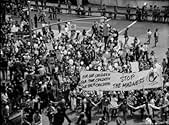My review was written in February 1984 after watching the film in a Manhattan screening room.
"In Our Hands" is an admirable documentary covering the massive (reportedly 1,000,000-people strong) anti-nuclear weapons protest march held in New York City on June 12, 1983. Producers Stanley Warnow and Robert Richter have created a concise film from the voluminous material shot by dozens of volunteer filmmakers, which serves as a timely reminder of the scope of the event, and its implications of grass-roots sentiments.
Sharing several of the performers the 1980 "No Nukes" film, "In Our Hands" is not a concert film but rather integrates the musical performance staged to entertain marchers at Central Park with speeches by nuclear freeze activists, interview material and wide-ranging views of the preparations and the march itself. Avowed goal of the picture to arouse ongoing disarmament fervor is undoubtedly optimistic, as it emerges as a record of an event that at most prescribes more rallies rather than a blueprint for action.
The march itself is very much a reminder of the peace and civil rights marches of the 1960s, though on a larger scale. Even the players, such as Pete Seeger and Dr. Spock, seem the same. Biggest difference is that the numerous policemen interviewed here all appear sympathetic to the cause, even when carrying off passive resistors on stretchers to jail in a June 14 followup rally of civil disobedience outside the major powers' U. N. mission.
Led by Helen Caldicott, of Physicians for Social Responsibility, film features many cogent speakers (including well-known celebrities) for the anti-nuclear cause, each interested in getting the message across to President Reagan. International scope of the movement is largely concentrated on a Japanese delegation of A-bomb survivors, whose pleas and testimony are movingly translated in voice-over by Meryl Streep and Anne Twomy.
Musical highlights include Pete Seeger's renditions of "If I Had a Hammer" and the very effective "Children's Cry" written by John & Joanne Hall and James Taylor, as well as Taylor's mellow reprise of his hit "You've Got a Friend".
Considering the diverse hands that contributed to it, film is technically smooth and probably could sustain a 35mm blowup for wider distribution.













